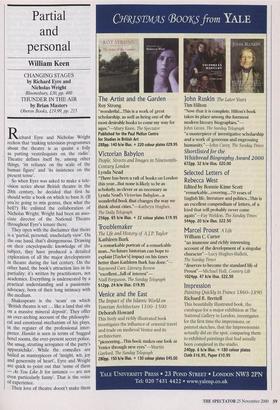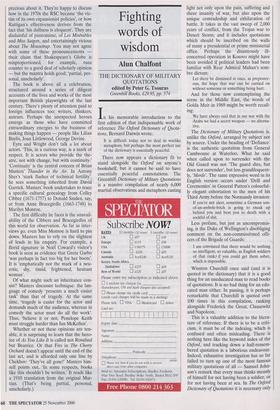Partial and personal
William Keen
Richard Eyre and Nicholas Wright reckon that 'making television programmes about the theatre is as quaint a folly as putting ventriloquists on the radio'. Theatre defines itself by, among other things, 'its reliance on the scale of the human figure' and 'its insistence on the present tense'.
So when Eyre was asked to make a tele- vision series about British theatre in the 20th century, he decided that first he should write a book on which to base it. (If you're going to mix genres, then what the hell?) He enlisted the collaboration of Nicholas Wright. Wright had been an asso- ciate director of the National Theatre throughout Eyre's tenure there.
They open with the disclaimer that theirs is a 'partial, personal, unscholarly view'. On the one hand, that's disingenuous. Drawing on their encyclopaedic knowledge of the subject, they have produced a detailed exploration of all the major developments in theatre during the last century. On the other hand, the book's attraction lies in its partiality: it's written by practitioners, not academics. Everything is underscored by a practical understanding and a passionate advocacy, born of their long intimacy with the medium.
Shakespeare is the 'seam' on which `British theatre is set ... like a land that sits on a massive mineral deposit'. They offer an over-arching account of the philosophi- cal and emotional mechanism of his plays, in the register of the professional inter- preter. Hamlet is seen in terms of 'bugged hotel rooms, the ever-present secret police, the smug, strutting arrogance of the party's apparatchike. While the comedies are hailed as masterpieces of 'insight, wit, joy and generosity of heart', Eyre and Wright are quick to point out that 'some of them — As You Like It for instance — are not even particularly funny'. That is the voice of experience.
Their love of theatre doesn't make them precious about it. They're happy to discuss how in the 1970s the RSC became 'the vic- tim of its own expansionist policies', or how Rattigan's effectiveness derives from the fact that 'his dullness is eloquent'. They are disdainful of pantomime, of Les Miserables and Miss Saigon, and entertainingly vicious about The Mousetrap. You may not agree with some of these pronouncements their claim that Shakespeare's Globe is misproportioned, for example, runs counter to a good deal of scholarly opinion — but the mantra holds good; 'partial, per- sonal, unscholarly'.
The book is above all a celebration, structured around a series of diligent accounts of the lives and works of the most important British playwrights of the last century. There's plenty of attention paid to foreign influences too; writers, .thinkers, auteurs. Perhaps the unexpected heroes emerge as those who have committed extraordinary energies to the business of making things happen — people like Lilian Baylis, Joan Littlewood, George Devine.
Eyre and Wright don't talk a lot about actors. 'This, in a curious way, is a mark of respect. It is actors who provide the the- atre, not with change, but with continuity.' `Continuity' is the central concern of Brian Masters' Thunder in the Air. In Antony Sher's 'stark flashes of technical fertility', he sees something inherited from David Garrick. Masters' book undertakes to trace a specific cultural genealogy from Colley Cibber (1671-1757) to Donald Sinden, say, or from Anne Bracegirdle (1663-1748) to Marilyn Monroe.
The first difficulty he faces is the unavail- ability of the Cibbers and Bracegirdles of this world for observation. As far as inter- views go, even Miss Monroe is hard to pin down. Masters has to rely on the slightest of leads in his enquiry. For example, a florid signature in Noel Coward's visitor's book is seen as evidence that Greta Garbo `was perhaps in fact too big for her boots'. It is 'emphatically not the mark of a neu- rotic, shy, timid, frightened, hesitant woman'.
Of what might such an inheritance con- sist? Masters discusses technique: the lan- guage of comedy 'presents a much easier task' than that of tragedy. At the same time, 'tragedy is easier for the actor and demands much of the audience, whereas in comedy the actor must do all the work'. Thus, 'believe it or not, Penelope Keith must struggle harder than Ian McKellen'.
Whether or not these opinions are ten- able, it is surprising to learn that the hero- ine of As You Like It is called not Rosalind but Beatrice. Or that Firs in The Cherry Orchard doesn't appear until the end of the last act, and is afforded only one line by Chekhov: 'They've all gone!' Masters him- self points out, 'In some respects, books like this shouldn't be written.' It reads like a 1910 translation from the original Mar- tian. (That's being partial, personal, unscholarly.)






























































































 Previous page
Previous page